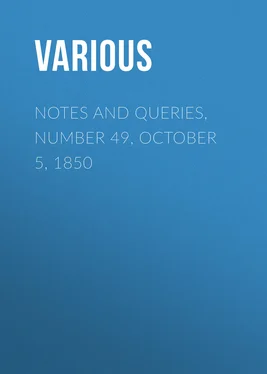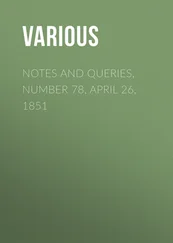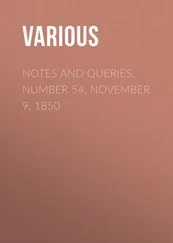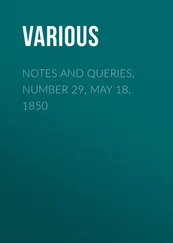Various - Notes and Queries, Number 49, October 5, 1850
Здесь есть возможность читать онлайн «Various - Notes and Queries, Number 49, October 5, 1850» — ознакомительный отрывок электронной книги совершенно бесплатно, а после прочтения отрывка купить полную версию. В некоторых случаях можно слушать аудио, скачать через торрент в формате fb2 и присутствует краткое содержание. Жанр: foreign_antique, periodic, foreign_edu, на английском языке. Описание произведения, (предисловие) а так же отзывы посетителей доступны на портале библиотеки ЛибКат.
- Название:Notes and Queries, Number 49, October 5, 1850
- Автор:
- Жанр:
- Год:неизвестен
- ISBN:нет данных
- Рейтинг книги:4 / 5. Голосов: 1
-
Избранное:Добавить в избранное
- Отзывы:
-
Ваша оценка:
- 80
- 1
- 2
- 3
- 4
- 5
Notes and Queries, Number 49, October 5, 1850: краткое содержание, описание и аннотация
Предлагаем к чтению аннотацию, описание, краткое содержание или предисловие (зависит от того, что написал сам автор книги «Notes and Queries, Number 49, October 5, 1850»). Если вы не нашли необходимую информацию о книге — напишите в комментариях, мы постараемся отыскать её.
Notes and Queries, Number 49, October 5, 1850 — читать онлайн ознакомительный отрывок
Ниже представлен текст книги, разбитый по страницам. Система сохранения места последней прочитанной страницы, позволяет с удобством читать онлайн бесплатно книгу «Notes and Queries, Number 49, October 5, 1850», без необходимости каждый раз заново искать на чём Вы остановились. Поставьте закладку, и сможете в любой момент перейти на страницу, на которой закончили чтение.
Интервал:
Закладка:
Various
Notes and Queries, Number 49, October 5, 1850
NOTES
STRAY NOTES ON CUNNINGHAM'S LONDON
The following notes are so trivial, that I should have scrupled to send them on any other ground than that so well-conceived and labouriously-executed a work should have its most minute and unimportant details as correct as possible. This, in such a work, can only be effected by each reader pointing out the circumstances that he has reason to believe are not quite correctly or completely given in it.
Page 24. Astronomical Society. —The library has been recently augmented by the incorporation with it of the books and documents (as well as the members) of the Mathematical Society of London (Spitalfields). It contains the most complete collection of the English mathematical works of the last century known to exist. A friend, who has examined them with some care, specifies particularly some of the tracts published in the controversy raised by Bishop Berkeley respecting "the ghosts of departed quantities," of which he did before know the existence.
The instruments to which Mr. Cunningham refers as bequeathed to the Society, are not used there, nor yet allowed to lie unused. They are placed in the care of active practical observers, according as the special character of the instruments and the special subjects to which each observer more immediately devotes his attention, shall render the assignment of the instrument expedient. The instruments, however, still remain the property of the Society.
P. 37. Bath House. —Date omitted.
P. 143.—Evan's Hotel, Covent Garden, is described as having been once the residence of "James West, the great collector of books, &c., and President of the Royal Society ." There has certainly never been a President, or even a Secretary, of that name. However, it is just possible that there might have been a Vice-president so named (as these are chosen by the President from the members of the council, and the council has not always been composed of men of science): but even this is somewhat doubtful.
P. 143. Covent Garden Theatre. —No future account of this theatre will be complete without the facts connected with the ill-starred Delafield; just as, into the Olympic, the history of the defaulter Watts, of the Globe Assurance Office, must also enter.
P. 143. near top of col. 2. "Heigho! says Kemble."—Before this period, a variation of the rigmarole upon which this is founded had become poplular, from the humour of Liston's singing at Sadler's Wells. I have a copy of the music and the words; altogether identical with those in the music. Of these, with other matters connected with the amorous frog, I shall have something more to say hereafter. This notice is to be considered incidental, rather than as referring expressly to Mr. Cunningham's valuable book.
P. 153. Deans Yard, Westminster. —Several of the annual budgets of abuse, obscenity, and impudent imposture, bearing on their title-pages various names, but written by "John Gadbury, Student in Physic and Astrology," were dated from "my house, Brick Court, Dean's Yard, Westminster;" or this slightly varied, occasionally being, "Brick Court, near the Dean's Yard," &c. I have not seen a complete series of Gadbury's Almanacks , but those I refer to range from 1688 to 1694 (incomplete). His burial in St. Margaret's, Westminster, in 1704, is noticed by Mr. Cunningham, at p. 313. As brick was then only used in the more costly class of domestic buildings, this would seem to indicate that prophecy was then a lucrative trade; and that the successor and pupil of the "arch-rogue, William Lilly" was quite as fortunate in his speculations as his master had been. It is a truth as old as society itself, that "knaves grow rich while honest men starve." Whilst Gadbury was "wallowing in plenty," the author of Hudibras was perishing for want of a crust!
P. 153. Denzil Street. —Here, about the middle of the street, on the south side, lived Theophilus Holdred, a jobbing watchmaker, whose name will always hold a place in one department of mathematical history. He discovered a method of approximating to the roots of numerical equations, of considerable ingenuity. He, however, lost in his day and generation the reputation that was really due to him for it, by his laying claim to more than he had effected, and seeking to deprive other and more gifted men of the reputation due to a more perfect solution of the same problem. He was, indeed, brought before the public as the tool of a faction; and, as the tools of faction generally are, he was sacrificed by his own supporters when he was no longer of any use to them.
I once called upon him, in company with Professor Leyburn, of the Royal Military College, but I forget whether in 1829 or 1830. We found him at his bench—a plain, elderly, and heavy-looking personage. He seemed to have become "shy" of our class, and some time and some address were requisite to get him to speak with any freedom: but ultimately we placed him at his ease, and he spoke freely. We left him with the conviction that he was the bonâ fide discoverer of his own method; and that he had no distinct conception, even then, of the principle of the methods which he had been led by his friends to claim, of having also discovered Horner's process before Horner himself had published it. He did not (ten years after the publication of Horner's method) even then understand it. He understood his own perfectly, and I have not the slightest doubt of the correctness of his own statement, of its having been discovered by him fifty years before.
P. 166. Dulwich Gallery. —This is amongst the unfortunate consequences of taking lists upon trust. Poor Tom Hurst 1 1 It may not be out of place here to mention one fine feature in the character of "Tom Hurst;" his deep reverence for men of ability, whether in literature, science, or art. Take one instance: Fourteen or fifteen years ago, I called one morning at his place of business (then 65. St. Paul's Church Yard, which has been subsequently absorbed into the "Religious Tract Depository"); and, as was my custom, I walked through the shop to his private room. He was "not in;" but a gentleman, who first looked at me and then at a portrait of me on the wall, accosted me by my surname as familiarly as an intimate acquaintance of twenty years would have done. He and Hurst, it appeared, had been speaking of me, suggested by the picture, before Hurst went out. The familiar stranger did not keep me long in suspense—he intimated that I had "probably heard our friend speak of Ben Haydon." Of course I had; and we soon got into an easy chat. Hurst was naturally a common subject with us. Amongst the remarks he made were the following, and in almost the words:— "When my troubles came on, I owed Hurst a large sum of money; and the circumstances under which I became his debtor rendered this peculiarly a debt of honour. He lent it me when he could ill spare it; yet he is the only one of all my creditors who has not in one way or other persecuted me to the present hour. When he first knew of my wreck, he called upon me— not to reproach but to encourage me —and he would not leave me till he felt sure that he had changed the moody current of my thoughts. If there be any change in him since then, it is in his increased kindness of manner and his assiduity to serve me. He is now gone out to try to sell 'a bit of daub' for me." Hurst came in, and this conversation dropped; but it had been well had Hurst been by his side on the day his last picture was opened to view at the Egyptian Hall. The catastrophe of that night might have been averted, notwithstanding Mr. Barnum and his Tom Thumb show in the adjoining room.
has not been in the churchyard these last eight years—except the three last in his grave. The last five years of his life were spent in a comfortable asylum, as "a poor brother of the Charterhouse." He was one of the victims of the "panic of 1825;" and though the spirit of speculation never left him, he always failed to recover his position. He is referred to here, however, to call Mr. Cunningham's attention to the necessity, in a Hand-book especially, of referring his readers correctly to the places at which tickets are to be obtained for any purpose whatever. It discourages the visitor to London when he is thus "sent upon a fool's errand;" and the Cockney himself is not in quite so good a humour with the author for being sent a few steps out of his way.
Интервал:
Закладка:
Похожие книги на «Notes and Queries, Number 49, October 5, 1850»
Представляем Вашему вниманию похожие книги на «Notes and Queries, Number 49, October 5, 1850» списком для выбора. Мы отобрали схожую по названию и смыслу литературу в надежде предоставить читателям больше вариантов отыскать новые, интересные, ещё непрочитанные произведения.
Обсуждение, отзывы о книге «Notes and Queries, Number 49, October 5, 1850» и просто собственные мнения читателей. Оставьте ваши комментарии, напишите, что Вы думаете о произведении, его смысле или главных героях. Укажите что конкретно понравилось, а что нет, и почему Вы так считаете.












